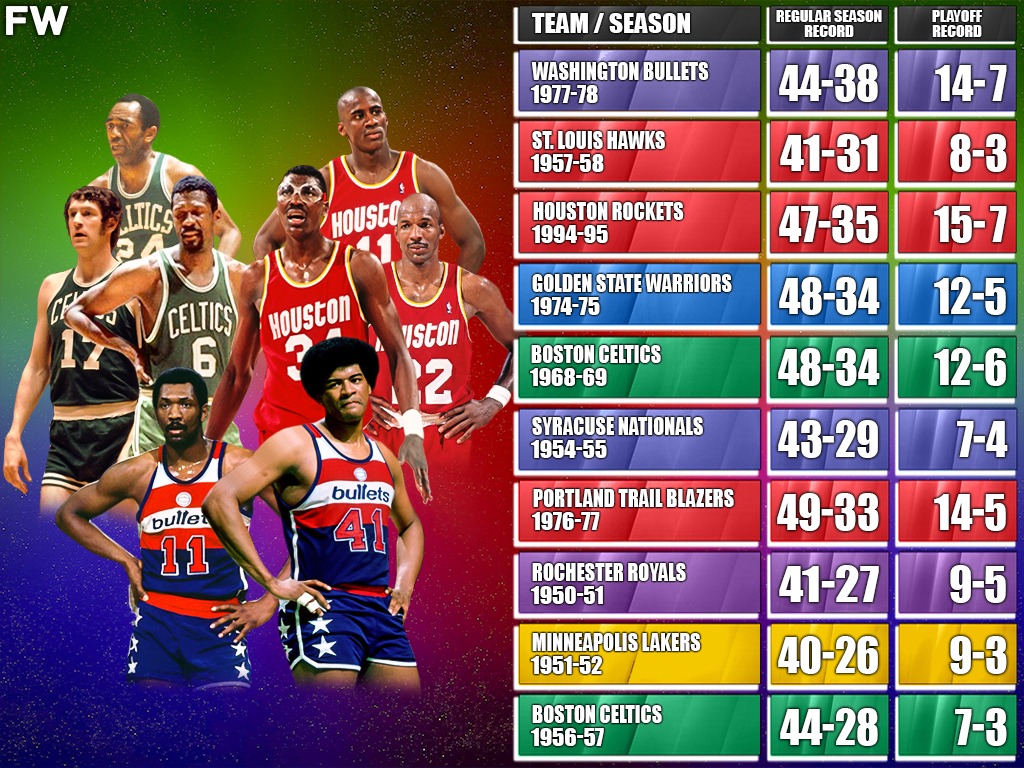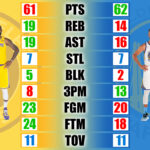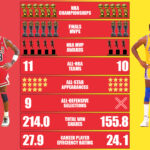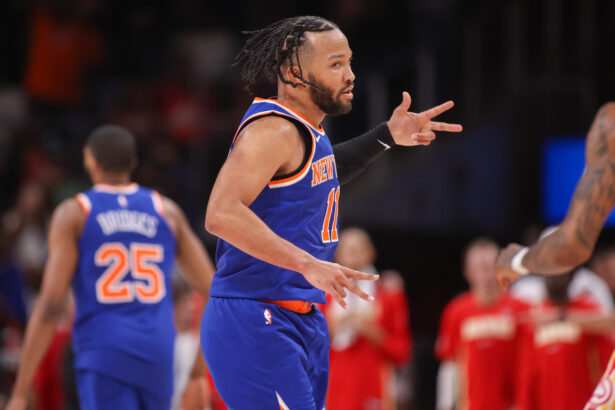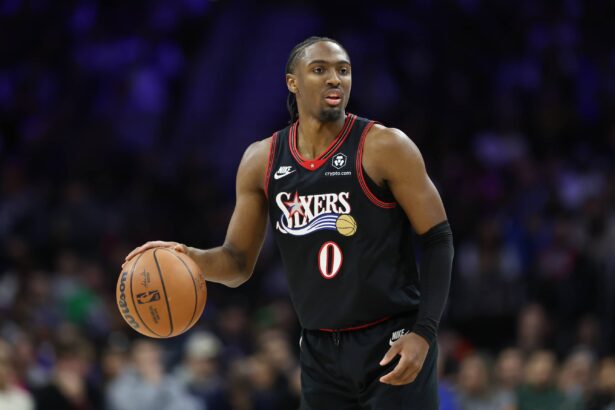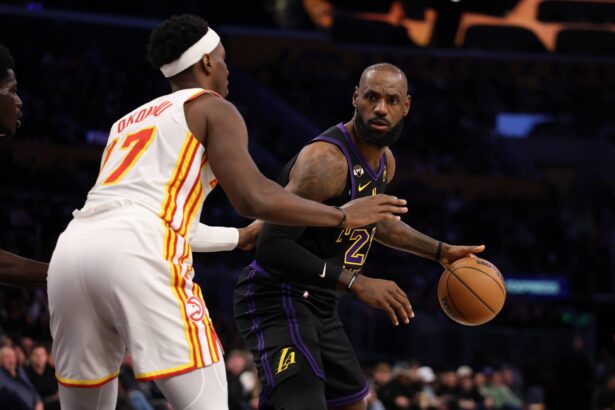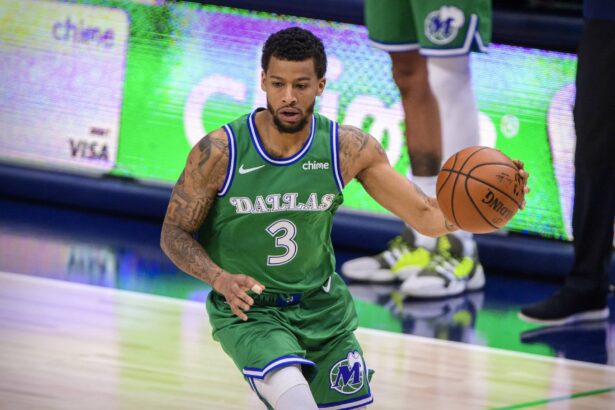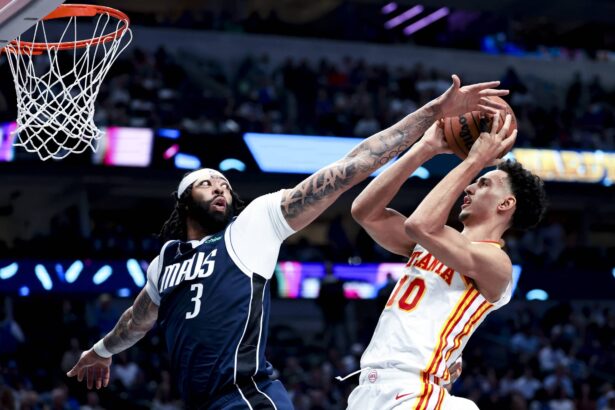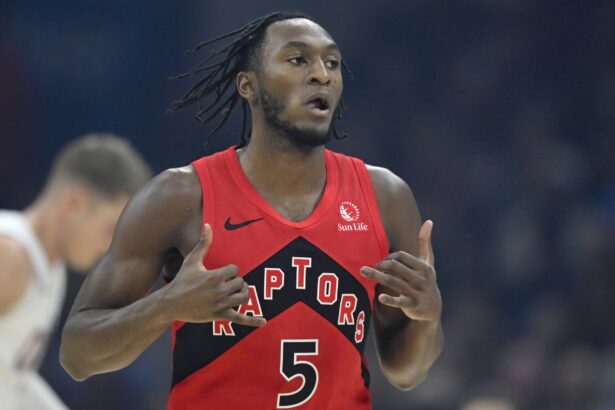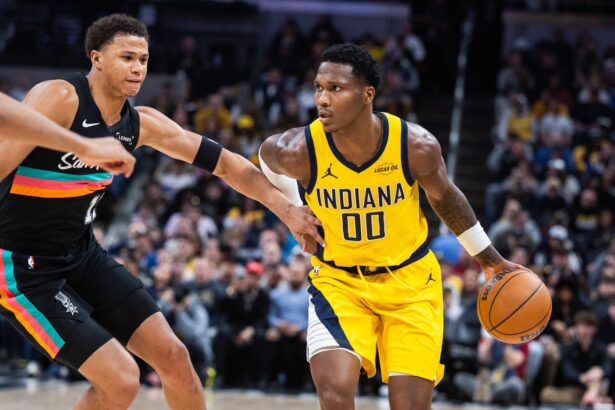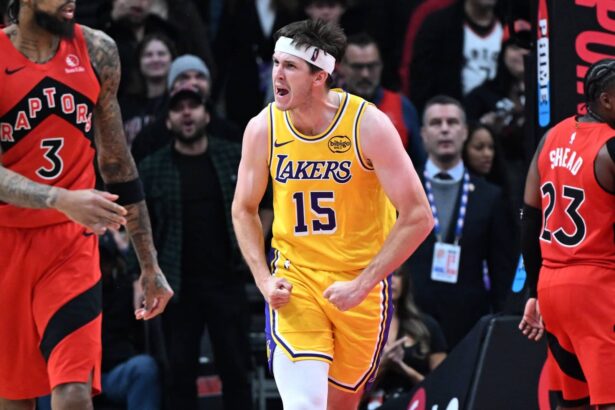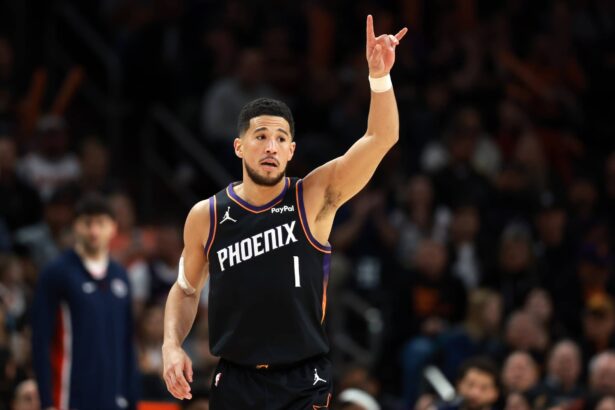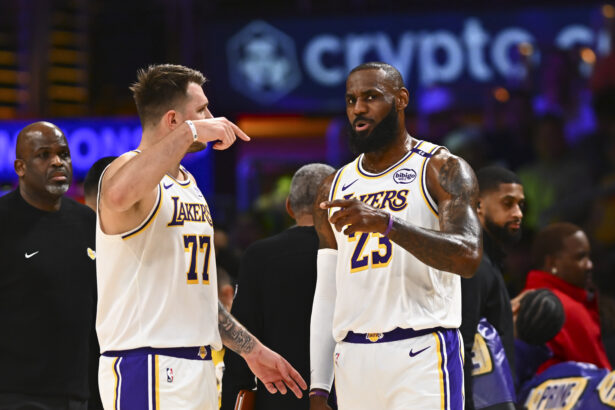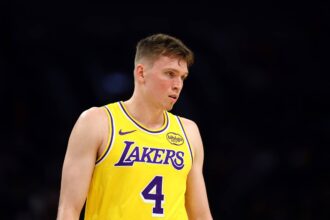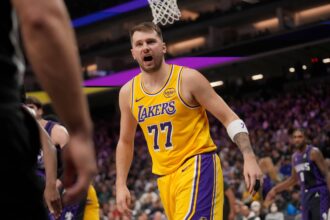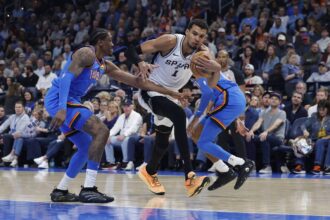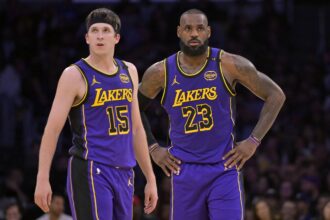Not all NBA champions are built like the best team in the league. For some teams, getting to the playoffs is all you need to do. Once you get to the playoffs, everyone’s record drops back down to 0-0. It can be anyone’s game once the first round begins. We see upsets all of the time, so why can’t a low seed march their way to the NBA Finals? With that said, we have never seen a seed lower than a six seed win an NBA championship, but we have seen a seven and eight seed make the NBA Finals before.
- 10. Boston Celtics 1956-57
- 9. Minneapolis Lakers 1951-52
- 8. Rochester Royals 1950-51
- 7. Portland Trail Blazers 1976-77
- 6. Syracuse Nationals 1954-55
- 4T. Boston Celtics 1968-69
- 4T. Golden State Warriors 1974-75
- 3. Houston Rockets 1994-95
- 2. St. Louis Hawks 1957-58
- 1. Washington Bullets 1977-78
- Next
- NBA Champions With The Best Regular Season Records: 1995-96 Chicago Bulls Are Still Unbeatable With 72-10
- The 10 Best NBA Players That LeBron James Beat In The NBA Finals
- LeBron James And Stephen Curry’s Best Teammates Throughout Their Careers (Only All-Stars)
- The 10 Most Loved Teams In NBA History
- The Superteam That Would Beat Kevin Durant’s All-Time Team In A 7-Game Series
Those teams made the playoffs as backend teams from the regular season. While some teams were running away with home-court advantage, other teams were battling adversity to even make the playoffs. These teams were able to put it together at the right time. These 10 champions own the worst regular season record. To make it fair, we used the worst regular season winning percentage given that the NBA did not implement a full 82-game regular season schedule until the 1967-68 season, while other seasons were shortened due to lockouts.
Two teams were also not included in this list despite technically being ranked in the top 10 for the worst winning percentage as champions. That included the 1947 champion Philadelphia Warriors and the 1948 champion Baltimore Bullets. These two champions were considered BAA champions and not NBA champions. We have limited this list to exclusively NBA champions.
These are the worst regular-season teams to win an NBA championship.
10. Boston Celtics 1956-57
Regular Season Record: 44-28 (61.11% Winning Percentage)
Playoff Record: 7-3
The Celtics were headlined by MVP Award winner Bob Cousy. Alongside him was the great rebounding legend Bill Russell, the dependable Tom Heinsohn, a future great head coach in Bill Sharman, and the consistent Frank Ramsey. Sharman led the team with 21.1 points per game and shot 90.5% from the free-throw line. Cousy led the team with 7.5 assists per game and averaged 36.9 minutes. Heinsohn played the most games, totaling over 70 games, while Russell shot 42.7% from the field and averaged 19.6 rebounds.
During the regular season, the Celtics started the year 13-3 but then suffered a streak where the team won seven of their next 11 games. The team eventually enjoyed a stretch of winning 12 of their next 14 games before ending the year on a sour note. The Celtics lost five of their final seven games of the season.
In the playoffs, Cousy rose to the occasion. He averaged 20.2 points per game. Alongside the 22.9 points of Heinsohn, the Celtics were unstoppable and lost only three games in the playoffs. Russell averaged 24.4 rebounds per game, while Sharman made 95% of his free throws. The Celtics swept the Nationals in three games before setting up a seven-game series with the Hawks, which included 37 points from Heinsohn and 32 rebounds from Russell in Game 7.
9. Minneapolis Lakers 1951-52
Regular Season Record: 40-26 (60.61% Winning Percentage)
Playoff Record: 9-3
After finishing second in the Western Division, the Lakers embarked on a memorable ride, which included one of the greatest finishes in the NBA Finals. The season featured the league widening the foul lane in an attempt to slow down superstar George Mikan. The change had little effect on Mikan, who still averaged 23.8 points per game. However, Mikan lost the scoring title to Paul Arizin.
The Lakers lost the divisional title by one game to the Rochester Royals. The team started the season 10-3 but then lost seven of their next 17 games. The Lakers had multiple three-game winning streaks but then followed that with three-game losing streaks. With that said, the team ended the regular season with a three-game winning streak to go into the playoffs with momentum.
The team began the playoffs with a two-game sweep over the Indianapolis Olympians. In the Division Finals, the Lakers relied on Mikan, Vern Mikkelsen, and Jim Pollard to score their way to a 3-1 series win over the Royals. That led to an intense seven-game series with the New York Knicks. Mikan was the leading rebounder in all seven games. In the final two games of the season, Mikan supplied 28 points and 15 rebounds in a loss and then 22 points and 19 rebounds in the Game 7 win.
8. Rochester Royals 1950-51
Regular Season Record: 41-27 (60.3% Winning Percentage)
Playoff Record: 9-5
The Royals were three games behind the Lakers in the Western Division. The Royals had a highly potent offense averaging 84.6 points per game, but the defense was unable to hold when the team allowed 81.7 points per game. The team was led by 6 foot 9 center Arnie Risen, 6 foot 7 Jack Coleman, and 6 foot 5 Arnie Johnson. The backcourt featured All-NBA First Team selection Bob Davies.
The regular season featured the team starting with a 3-6 record. Eventually, the team pushed to a 9-8 record on December 7 and then never fell below .500 again that season. At one point, the team grew to 19-10, but the team struggled consistently and had a 31-25 record with a handful of games left. The regular season ended on a high note by winning 10 of their final 12 games.
The first round of the playoffs featured a 2-1 series win over the Pistons. After that, the team made quick work of the Lakers after losing the first game of the series. The NBA Finals with the New York Knicks was a dogfight. The Royals blew a 3-0 series lead to set up a Game 7 at home. The team used 24 points and 13 rebounds from Risen to take the 79-75 win in the final game.
7. Portland Trail Blazers 1976-77
Regular Season Record: 49-33 (59.76% Winning Percentage)
Playoff Record: 14-5
This was one of the most memorable seasons for Bill Walton. The All-NBA Second Team center secured the Finals MVP Award by the end of the season. As of now, this remains the team’s only championship. The team started the season by winning 22 of their first 31 games, as well as their final games of the season.
The Trail Blazers won a total of 45 home games this season if you count the 10-0 record at home. Despite all of this success, the team was chasing the Lakers and Nuggets all season. The Lakers won the division with 53 games, while the Nuggets secured the No. 2 seed with 50 games.
Portland won the first-round series over the Bulls and then took care of the Nuggets in the second finals in six games. Despite losing to the Lakers in the regular season, the Trail Blazers swept the Lakers in four games in the Conference Finals. Between Maurice Lucas, Lionel Hollins, and Walton, the Lakers could not stop the trio. In the Finals, the team dropped their first two games at the 76ers. The team rebounded with four straight wins, including a 20-point game from Hollins and Walton, as well as 23 rebounds from Bob Gross.
6. Syracuse Nationals 1954-55
Regular Season Record: 43-29 (59.72% Winning Percentage)
Playoff Record: 7-4
Dolph Schayes was the 26-year-old stud that led this team at the time. Schayes led the team with 18.5 points and 12.3 rebounds. Paul Seymour added 14.6 points and 6.7 assists, while Red Rocha, Red Kerr, and Earl Lloyd rounded out the scoring attack. The team struggled out of the game and owned a 17-13 record heading into January. The team didn’t break away from the middle of the pack until mid-February.
At 35-25, the team began to pull away by winning eight of their final 12 games. Schayes earned All-NBA First Team honors, while Seymour landed on the Third Team. With 43 wins, the team managed to win the division with five games to spare over the Knicks. In the playoffs, the team defeated the Celtics in four games which featured Schayes scoring 22 and 28 points in two of the team’s wins.
The Finals featured a seven-game series with the Pistons. The team won the first two games of the series, but then the home court shifted, and the Pistons won the next three games. In Game 6, the 76ers escaped with a 109-104 win, with Schayes leading the way with 28 points. The final game of the series was tight. As time ran out, team guard George King sank a clutch free throw to give the team a 92-91 lead and then stole the following inbound pass to clinch the title.
4T. Boston Celtics 1968-69
Regular Season Record: 48-34 (58.54% Winning Percentage)
Playoff Record: 12-6
For a team that owned the best defensive rating in the NBA, the team still placed fourth in the Eastern Division. The Baltimore Bullets, Philadelphia 76ers, and New York Knicks were all better and won more than 50 games. The Celtics were in their older stage in what would be Bill Russell’s final season.
The team heavily relied on John Havlicek, Bailey Howell, and Sam Jones on offense. The Celtics rushed to a 19-6 record to open the season. The team dropped a handful of games and played .500 basketball for the remainder of the season. The team never had a winning streak greater than five games, but the team went into the playoffs with momentum by winning their last four games.
The playoffs featured a five-game win over the 76ers and then a six-game series win over the Knicks. The Finals featured a legendary seven-game series against the Los Angeles Lakers. After losing the first two games, the Celtics used the scoring of Havlicek and the rebounding of Russell to take the next two games. After dropping Game 5, Don Nelson dropped 25 points in Game 6, while Havlicek’s 26 points led the team to a 108-106 win in Game 7.
4T. Golden State Warriors 1974-75
https://www.youtube.com/watch?v=1kE7tjVtWk4
Regular Season Record: 48-34 (58.54% Winning Percentage)
Playoff Record: 12-5
The league MVP, Rick Barry, led the Warriors to the best record in the Western Conference. It appeared that no team was going to run away with the division during this season. The top five teams in the league all had 40 wins, while the Warriors and Bulls jostled for the top seed, with the Warriors beating the Bulls by one game.
Barry was a First-Team All-NBA selection and the team’s lone All-Star, while Jamaal Wilkes was the Rookie of the Year. The success came at an even greater surprise, knowing that the team traded away Nate Thurmond to the Bulls in the offseason. However, Coach Al Attles implemented a team-oriented system that saw 10 players scoring in the game at times.
The playoffs began with a six-game series over the SuperSonics. In the Conference Finals, the series went to seven games, and the team thought they were going to lose to the team where they traded Thurmond. Instead, the team won the final two games, with Barry scoring 36 points in Game 6 and Wilkes scoring 23 points in Game 7. The Finals featured a four-game sweep where Barry scored the most points in all four wins.
3. Houston Rockets 1994-95
Regular Season Record: 47-35 (57.32% Winning Percentage)
Playoff Record: 15-7
The Rockets were coming off winning their first championship in franchise history. The following season felt like a hangover as the team dropped to the No. 6 seed. Needing a spark, the team made a blockbuster trade to acquire All-Star Clyde Drexler and three-point specialist Tracy Murray. Drexler was an instant fit with the team as he was a college teammate with All-Star Hakeem Olajuwon.
With that said, the Rockets finished 18-18 in the second half of the season. Olajuwon averaged 27.8 points, 10.8 rebounds, 3.5 assists, 1.8 steals, and 3.4 blocks per game. Meanwhile, Drexler averaged 21.4 points, 7.0 rebounds, 4.4 assists, and 1.7 steals in 35 games. Olajuwon was fifth in the MVP voting, but fans were skeptical of what the team was going to do in the playoffs, given how the team was finishing with an average ending. That included going 7-87 in March and 5-7 in April.
The playoffs were a different story as the team ground out a trip to the NBA Finals. That started with winning the first-round series in the full five games over the Jazz. In the second round, the team trailed the Suns 3-1 but rebounded for three straight wins to win the series in seven games. In the Conference Finals, the Rockets were tied 2-2 with the Spurs but used 42 and 39 points from Olajuwon in Games 5 and 6. In the Finals, the team made quick work of the Magic and Shaquille O’Neal in a four-game sweep.
2. St. Louis Hawks 1957-58
Regular Season Record: 41-31 (56.94% Winning Percentage)
Playoff Record: 8-3
The Hawks had a solid roster constructed. Bob Pettit was a First-Team All-NBA player, while Slater Martin and Cliff Hagan each made the Second Team. Pettit was third in the scoring race, while he was second in rebounding. Along with Pettit’s 24.6 points per game, Hagan added 19.9 points, while Ed Macauley added 14.2 points. The team had three players average double-digit rebounds with Pettit at 17.4, Chuck Share at 10.4, and Hagan at 10.1.
The Hawks started the season off slow at 4-5 but used two seven-game winning streaks to help prompt their record to 20-9. The team played average basketball for two months, though, and the team was 32-23. The team finished the regular season 9-8, including losing the last three regular season games.
It was enough for the team to make the playoffs and set up a first-round matchup with the Pistons. The Hawks made easy work of the team, with Hagan scoring the most points in all five games. The NBA Finals featured a battle between Pettit and Bill Russell’s Boston Celtics. After the series was tied 2-2, Pettit scored 33 points and 21 rebounds to lead a 102-100 win in Game 5. The final game featured 50 points and 19 rebounds from Petit to seal the title.
1. Washington Bullets 1977-78
Regular Season Record: 44-38 (53.66% Winning Percentage)
Playoff Record: 14-7
The team’s big three, Elvin Hayes, Wes Unseld, and Bob Dandridge, were all in their 30s. Hayes led the team in scoring with 19.7 points, while Dandridge was close behind with 19.3 points of his own. Mitch Kupchak and Kevin Grevey each scored over 15.0 points per game. Unseld was the team’s top defensive specialist with 11.9 rebounds, but it was Hayes that led the team in rebounding with 13.3.
It was a slow start for the team as the Bullets lost six of their first 10 games. However, the team found a hot streak in December and January to cap an 18-5 stretch in 23 games. That stretch would help the team finish second in the division and third in the conference as the Bullets played .500 basketball during the final stretch of the regular season. The Bullets won the lowest number of wins of a championship team for a team that played a full 82-game schedule.
The 70s featured some great Bullets teams that lost in the Finals, including in 1971 to the Bucks and in 1975 to the Warriors. The matchup with the Seattle SuperSonics featured the team going back and forth, never winning more than two games. With Seattle up 3-2, Hayes recorded 21 points and 15 rebounds in a blowout 117-82 Game 6 win. In the winner-takes-all Game 7, Dandridge and Charles Johnson each scored 19 points, while Unseld added nine rebounds and six assists to lead a 105-99 victory.

